![]()
The Words The Kwak Family
|
|
The Words The Kwak Family |
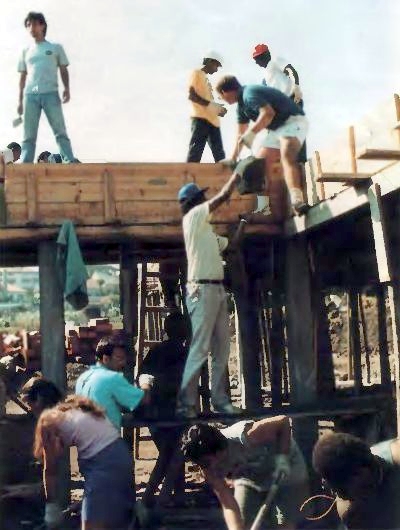
Buckets
of cement are lugged to the roof of the day care center under
construction at site 3.
The Religious Youth Service is no ordinary relief and development project. It is a project with an inter-religious vision for world peace and justice. This type of project brings a powerful vision that can inspire the idealism of young people everywhere.
Young people are the ones most thirsting for real change in society. Their minds are open, their hopes are high, and their idealism is alive. Young people have boundless enthusiasm and desire to help their nation and the world. The question is, how can this youthful enthusiasm be best directed? How can it avoid destructive paths and find constructive paths? How can it maintain authentic values and not latch onto plans which promise easy solutions but fail -- leading to despair, materialism, and selfish abuse of power?
The source of the life and values that can bring peace, justice, and equality in society is God. Politicians may promise many things, but only God provides the foundation for lasting goodness. When a person meets God, his life is transformed. He puts away corruption and destructive habits and lives for righteousness. Likewise, when a nation meets God, it becomes a new nation. The goal of religion is to change the world, to make it follow God's direction. A nation's religious institutions are the primary representatives of God for that nation. Portugal has been strengthened and guided by the Roman Catholic Church; God has nurtured her faith through the visions at Fatima and through the examples of its saints and right-minded clergy. The Catholic Church has long been helping the poor and needy people of Portugal.
Today, however, religions have much competition from materialism and secular world views. The greatest secular and materialist challenge to religion is communism. Communism presents a plan to reach an ideal world through radical political and economic change. Communism attacks religion, saying that religions are narrow- minded and self-serving. This influences many young people. Young people are not narrow-minded, and so they wonder why religions do not see or reach out beyond their own boundaries. Young people want to sacrifice for the world, and so they wonder why religions so often permit complacency and self-indulgence among believers.
Then what must religions do? Number one, they must overcome narrow-minded attitudes. We can excuse factions and divisions within the world of business or the world of politics, but to see factionalism, divisiveness, and intolerance among religions is very discouraging. Religion defeats its own purpose through sectarianism. This defeats the very values for which it stands. Therefore, religious divisions are the most serious ones in society. Jesus said, "By this all men will know that you are my disciples, if you have love one for another:" Religious conflict causes people to be skeptical and critical of religion. It saps the vitality of religions and makes it difficult for God to work.
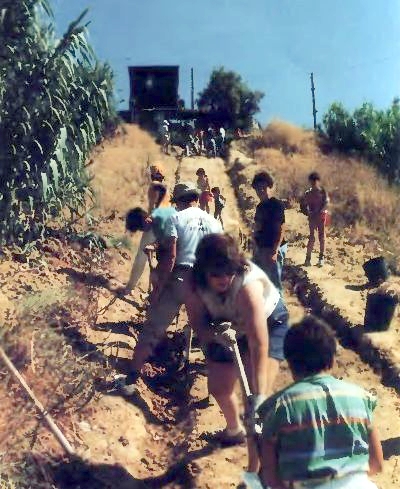
At
site 1, the group prepares to build a stairway as children of the
community lend support.
Often it is the religious leaders, secure in official positions, who inhibit religious harmony. Institutions tend to be inflexible. Their first reaction tends to be defensive. I myself am in a position of helping to lead a religious institution, so I counsel myself, as well as the other religious leaders here, to be open and flexible, to remember that God is above every institution, and that God works often in mysterious ways.
Look at the young people here: Catholics, Protestants, Buddhists, Jews, Hindus, Muslims, Sikhs, Jains they come from every religion. They will live and work together, share their respective faiths, and mingle their sweat in serving the people. Let the religions of the world stand back and observe: These young people will not lose their faith. Their faith will grow deeper! Their love of God will grow stronger! The Catholic participants will become better Catholics; the Muslim participants will become better Muslims; the Jewish participants will become better Jews; the Buddhist participants will become better Buddhists, and so on. In addition, they will have this foundation to be inter-religious ambassadors, able to understand and fellowship with men and women of all religions. They will become the next generation of leaders of their religions with the experience and training to know how to foster world peace.
Number two, religions must encourage and inspire young people into sacrificial action for the sake of the world. Young communists willingly sacrifice even their lives for a revolution promising only this-worldly happiness. People may caution the young and tell them that the communist paradise is a mirage, but that cannot cope with the powerful attraction of an ideology that offers to harness the idealism of youth in practical action. The proper home of idealism is religion. Religions should be the ones to give young people an opportunity to serve humankind. The energy of the young can be a boundless resource for the Kingdom of God.
Therefore, young people must lead the way, with a vision to act for God and for the world. The youth can break down the barriers that have separated religions, races, and nations, in the name of God and the highest human ideals. This will liberate the heart of God, and when God's heart and love are felt, people have vision, inspiration, and energy. Young people can liberate God's power to change society. This is the real, ultimate liberation theology -- the liberation of God's love, the true love liberation. And this is also the only way to bring about authentic human liberation.
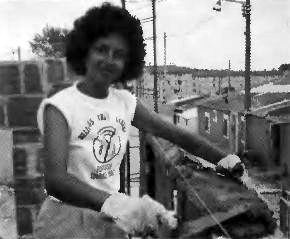
Marcia
de Abreu lays bricks in the process of building a community center at
site 2.
Responding to God's call and to their own ideals, 120 volunteers from 42 nations took part in the second Religious Youth Service project, held this year in Portugal from July 15 to August 20.
In November 1985 at the Assembly of the World's Religions, Father appealed to religious leaders to put aside their differences of theology and help create a program through which international young people could work together to alleviate the suffering of God's needy sons and daughters. The Religious Youth Service (RYS) was founded at that historic conference with the purpose of actively creating religious harmony through dialogue and cooperative service in impoverished areas of the world. The International Religious Foundation (IRF) and the International Relief Friendship Foundation (IRFF) became the co-sponsors of RYS.
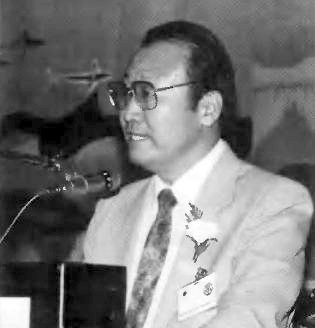
Rev.
C. H. Kwak speaks at the opening banquet.
Out of over 500 applicants, the 120 volunteers who were selected for this year's program represented Christianity, Islam, Judaism, Buddhism, Hinduism, Jainism, and Sikhism. I was among several Unificationists invited to join the project. We all put our universal religious principles into action by constructing several public buildings and creating sanitary facilities in some of the most poverty- stricken areas in and around Lisbon.
The project began with seven days of orientation at the Catholic Seminary of Torre d'Aguilha near Lisbon. Guest professors gave lectures on their own religious traditions and on Portuguese culture and history. Visits to a local mosque, a Hindu temple, and a Catholic cathedral were also part of the program. We even had an audience and reception with the assistant to the mayor of Lisbon, who expressed his appreciation for the courage and idealism of the RYS volunteers.
Rev. Chung Hwan Kwak, the president of IRF, gave the keynote address at a dinner banquet for the participants and a number of local religious, civic, and academic leaders. He expressed our hope that we could make a significant contribution to Portugal and "pave the way for more such inter-religious action for world peace all over the world."
After being divided into five teams, we departed to our respective work and living sites. The living standards at the five work sites varied; however, poverty, malnutrition, unsanitary conditions, and infectious diseases were rampant in all of them. We worked in several of the poorest communities of Portugal where people lived in cardboard shacks or in other very poor housing conditions -- called barracas (slums).
We were confronted with two main challenges: to construct needed facilities for the Portuguese people and to build good relationships among ourselves.
To fulfill our external mission, we had to work hard in an unfamiliar environment. Investing ourselves in such strenuous work was a cleansing experience. As one Unificationist brother, Joseph Flowers, said, "During the hours of work we would only think about mixing cement, lifting bricks, carting sand.... There was no room for self-centered thinking" As we experienced the reality of the people's poverty, the value of our service to them became very apparent to us. We had hoped that by making their living conditions more tolerable, the people would be inspired to do things for themselves, to lift themselves up out of the barracas and practice love by serving others.
However, because so many times the people in some of these communities had heard promises of help that never came, they didn't show any outward trust in the beginning; they waited to see if we would really accomplish what we said we would. In such circumstances, as Michael Giampaoli, executive director of IRFF, observed, there is really a bigger challenge to give. In fact, it is so easy when people love you and so much different when they don't. Some of our participants struggled with this, but then they realized how much greater it is to sacrifice and give when there is no expression of love or acceptance in return. How much deeper your heart can grow! With this kind of understanding, the participants were able to overcome the struggle and turn the experience into a positive one.
But gradually the people became curious about us; they questioned how much the women could do and were astounded to learn that we were not being paid. Only as they saw us committed to the work did they begin to express acceptance, even to the point of volunteering to help us. Each day one more person would feel moved to roll up his sleeves and start shoveling or laying bricks with us. One of the women even gave us the key to her house so we could use the kitchen and bathroom any time. The children, who in the first few days would play around our work site and throw stones and spitballs at us, became eager to help and be part of us. The love we began to feel from them gave us the strength to challenge ourselves even more. Indeed, their response and involvement with us showed us the great impact we were having on their lives.
Our second main challenge was internal -- developing interpersonal relationships with the others in our group. The groups had been carefully created -- there was a good cross- section of religions, races, and cultures in each one.
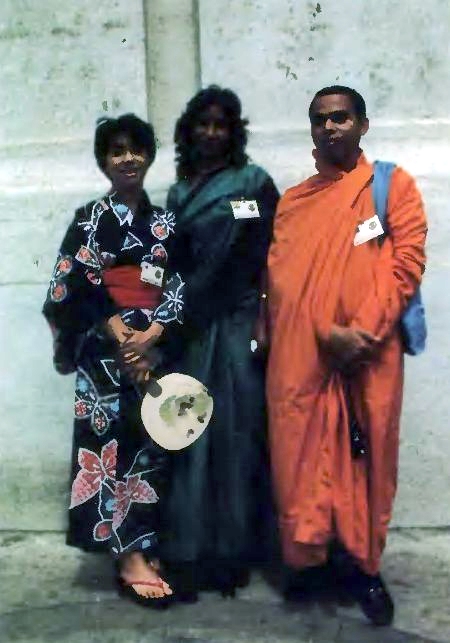
Three
of the volunteers -- a Japanese Christian, an Indian Hindu, and a
Buddhist monk from Bangladesh -- pose in front of the city hall of
Lisbon.
Nancy Yamamoto, assistant to the project coordinator, relates:
In an internal sense, this project was successful -- in terms of the experience of the young people from diverse backgrounds relating with each other and actually changing internally. I saw people able to overcome their concepts and prejudices against different nationalities, religions, and races and experience respect and love for one another.
Irfan Omar, a Muslim from India, shared that this was the first great experience he had had in his life:
I felt like I had been inside a well with my own vision. But here I came out of the well by meeting other religions and other people, by being exposed to a greater variety of people and faiths. My greatest difficulty before coming to RYS was going beyond my faith. It was like a bondage. I was not so open-minded. That limitation has been crossed now, and the idea that God is the God of all crept into my mind.
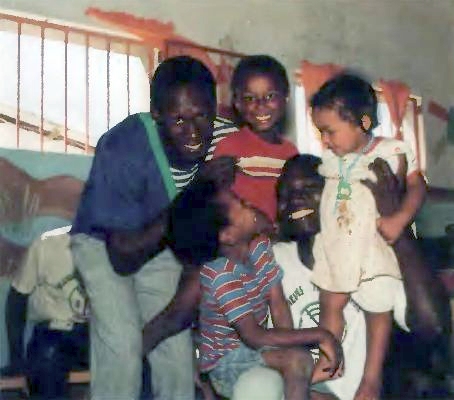
Sylvester
Deigh from Sierra Leone and Henry Ndele from Kenya delight the
Portuguese children.
Adena Hellig, a Jewish participant from South Africa, gave this testimony:
When leaving for the RYS, I knew I would have many difficulties to face, things I never experienced before. I had never shared a room with a person with a skin color other than white. I knew I would have to do that. Now, in retrospect, all those fears and anxieties seem so useless. I was pleased to discover that we are all alike. It's important not to judge people before you know them. I'll never do that again.
Nancy Yamamoto explained that at last year's RYS project in the Philippines, the difficulties faced by the participants were more on an external, environmental level, whereas the challenges this year were more internal and personal. In the Philippines, the participants had to face typhoons, extreme heat and humidity, uncomfortable accommodations, monotonous food, and severe working conditions. This year in Portugal the external circumstances were not too difficult. We had good accommodations, abundant and good food, and only a few days of really hot weather. However, as Nancy points out, in Portugal people had to deal more with each other than with harsh external conditions. The problems were internal ones; participants and site leaders had to face each other and overcome many difficulties in their own hearts. I feel that the struggles and the victories that people were able to take with them were really life-changing. In some ways I would say that even though Portugal was more difficult than the Philippines, it was also a more meaningful and deeper experience.
Another difference was that in Portugal, all the sites were located in the city of Lisbon or its vicinity, making it easy for the five groups to come together at various times. This proved to be a great source of inspiration, because through sharing our ideas and experiences we could deepen our friendships as well as learn from others how to make better use of our discussion times, improve our schedule, etc.
Many of the participants were well-to-do graduate students or professors; and a few were working on their Ph.Ds. Some were involved in government, some were ordained clergy, and some were engaged in interfaith work or social work in their home countries. A few were married to someone of a different faith. But what all of us had in common was the fact that we voluntarily gave up our summer -- forgoing school, job, and family -- to work together on a project of sacrificial service. For many it was the first opportunity to do hard physical labor and to witness severe poverty firsthand. One might think that harmony would be difficult to achieve in such a diverse group. But because everyone had the same concrete goal, it was possible for the group to realize an amazing degree of unity. Everyone made an effort to maintain an open heart and to overcome personal objections to each other's habits, ideas, and personalities. Indeed, unity is not achievable in theory. We can only realize unity if we serve people in real-life situations, dealing with the actual needs and demands of each other. We were all confronted daily with the choice of being either a participant in the process or a mere observer.
Our gathering was not an ordinary event. Every participant desired some kind of living communication with God. I believe this fact fundamentally encouraged our efforts to practice the selfless attitude that every religion teaches.
As we concluded each project, the local people offered us farewell parties to express their gratitude. Community leaders delivered speeches, and in some cases we were given souvenirs of Portugal. Leaving our work site was a tearful experience. As an expression of the deep bonds of heart that were created during our three and a half weeks there, our Portuguese friends formed chains, hand in hand, preventing the buses from departing. No one wanted to say good-bye!
In the following days we visited Fatima, the site of Mary's visionary appearance to three children at the beginning of this century. For our group this will be an unforgettable memory. The spirit at Fatima is universal, and it constitutes an invitation to all to connect more deeply with the Ultimate. For us it was a call to recommit ourselves to the task of building a world of peace and justice through service and love.
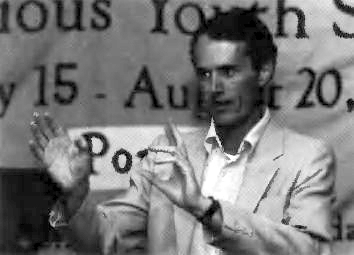
Gary
Young speaks to the participants during orientation week.
Romesh Modayil, a Methodist minister from India, shared these words with us:
I've been shown that beyond the dialogue of mind we went to the dialogue of the heart. This ultimately proved to me that if there's going to be a better world it will start in our hearts. This experience has shown me that we have laid the pillar for this new heaven and earth.
At the closing banquet held at the Sheraton Hotel in Lisbon, the newly elected minister of education of Portugal, Dr. Roberto Carneiro, thanked the volunteers for their courage and promised that when he goes to his office to begin his work he'll take with him the spirit he received from the young people at RYS. The RYS project coordinator, Gary Young, delivered a touching final message, saying that "love expressed through service melts away the resentment and the mistrust that have existed between rich and poor, North and South, black and white, healing the deep seated wounds of humanity." In appreciation for their contribution to the nation of Portugal, each participant was awarded a certificate and a miniature "brick" with the initials RYS.
I believe this project provided a resurrecting experience for everyone. I feel a step forward has indeed been made, as Father hoped, toward the prevention of future conflicts and wars and toward the realization of an ideal world of peace and harmony.
RYS is a historic demonstration that the religions and people of the world can work together for world peace. The challenge that we all face now is how to continue in this spirit to practice love and service for the rest of our lives.
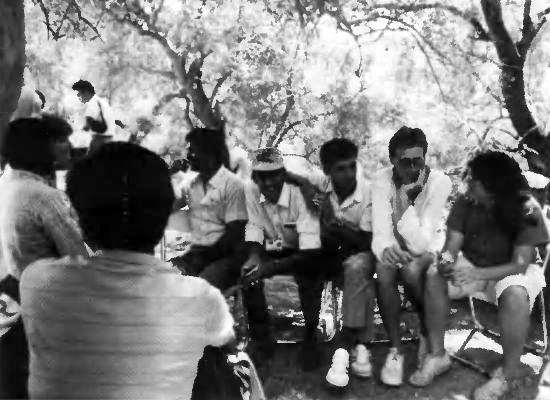
Enjoying
a conversation at a weekend picnic.
I was able to participate in the RYS in Portugal as part of the medical staff. As one of the participants put it, we built different things at the various work sites, but most of all we built relationships.
Practicing my own faith was difficult because I had certain expectations about how others should think and behave. However, I felt liberated as I realized that God wanted me to be real and honest with myself and others, not always trying to think whom and what I am supposed to represent. I learned not to expect others to practice the same kind of behavior and philosophy of life as I do. I simply have to practice my own beliefs according to my understanding. I found, too, that the amount of respect I was able to give others was the amount I received.
I was confronted with my limitations in accepting other people, especially in my relationship with one of the participants. I saw in her a lack of sincerity; I felt she did too much intellectualizing and not enough "doing." I tried to resolve my bad feelings about her within myself, but finally I exploded with an outburst of emotion in front of her. Yet I felt that somehow we should be able to depart from each other at the end with a good feeling, even if we could never be close friends.
God sometimes works in unusual ways -- and I don't always like them. "Coincidentally," the last three nights of our stay she was assigned to share my room. I don't know how she felt, but my response when I heard the news was: "Oh, no!" I was already feeling much pain thinking of the imminent departure of my friends.
On the last day, however, I experienced something incredible. We both got up at six a.m. to say good-bye to the first ones leaving. When we returned to our room, I started sharing with her how the night before, as I was sitting with everyone, I tried to reflect on all the "bad" things that had happened at the worksite. But surprisingly, they didn't come to mind. I realized that that must be what the Kingdom of Heaven is all about: In an atmosphere of love, your mind just has no room to focus on the bad things or on how others have hurt you. She was inspired to hear this. Then just before she got ready to leave, she gave me a big hug. Tears started streaming down her face as she asked for my forgiveness. I too started crying. It felt so liberating to forgive her. I feel now that I can meet her freely in the future as one of my sisters, and I more deeply understand the importance of seeking and giving forgiveness.
One of the most difficult religions for me to relate to before I went to Portugal was Hinduism, but there I developed a deep friendship with a Hindu brother from Bangladesh. Because we have the same Creator and were in Portugal for the same purpose, we found that we could share the same ideas about life, despite our differences in doctrines. I know we will be life-long friends.
God is asking us to see others as our brothers and sisters, as His children, before looking at the barriers that separate us. I feel now I am able to love people who are very different from me -- to embrace them for what they are. If I did not learn or accomplish anything else in Portugal, I know now that I am able to love -- not merely because it is expected of me, but because I experienced it.
I feel a new beginning in my life. I feel much more connected to the world, and I want to find how I can help in a more substantial way. Although I found new hope, I have wept many times as I confront the limitations within myself and those I see in others. I realize that the problem is not that a person wants to do evil but that Satan wants to destroy all of us. Now I can't just read the newspaper and simply say, "I see there's another war going on between India and Sri Lanka;' because now there are people connected to these countries whom I feel very close to. I can't just passively read about the religious problems between Muslims and Hindus -- one of my best friends is directly involved!
After our work projects were over, all the participants went to Fatima for reflection. Fatima is a small town in the countryside in Portugal where Mary -- the mother of Jesus -- appeared to three children in 1917. Her basic message to the children was to repent for the sins of the world, make sacrifices, and pray for world peace and harmony. Each year thousands of pilgrims travel to Fatima to pray and be healed there.
We stayed in a hotel near the sanctuary where Mary appeared. There we heard testimonies, shared, and reflected about the weeks we spent together in Portugal. We also attended the services at this pilgrimage place. I was deeply moved when I watched the people, including some of our own participants -- Sikh, Hindu, Christian, it didn't matter -- walking on their knees as a sacrifice and to offer their repentance to God. I realized the importance of sacrificing at whatever level you might he -- as long as your heart is behind it. The expression "To whom much is given, much is asked" became meaningful to me. If you find the living God, then your responsibility in life is greater -- to repent and sacrifice not only for yourself but also for others.
It was inspiring to see that the RYS project didn't stop in Portugal; its vision was carried home by many of the participants. They expressed their gratitude toward Rev. Moon for making the whole project possible. His great vision and hope enabled us to go beyond ourselves.
I hope that all of you can participate in a project like RYS, when e you can really be challenged to live your beliefs rather than to just talk about them. When Gandhi was asked about his religion he responded, "Look at my life; then you will know my religion.
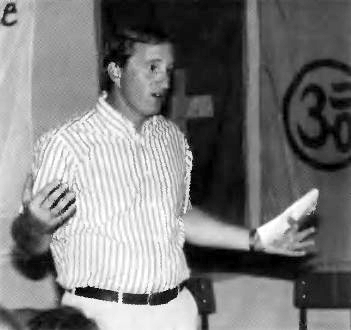
Michael
Giampaoli prepares the group for the physical realities of work.
The five groups of RYS volunteers worked in various slum areas in and around the city of Lisbon.
Site 1 was Curraleira, in the heart of Lisbon. Its over 5,000 residents, made up of displaced people from the rural areas of Portugal, live in small one-room shanties made of scrap wood and brick. Directed by Philip and Isilda Withers, the participants constructed a public shower and bath, a covering for a clothes-washing area, a concrete pathway between the homes, and a day-care center.
Musgueira Norte, site 2, directed by George Emery and Sara Hartzell, is located on the outskirts of Lisbon. Originally a refugee camp, it has become a permanent settlement of small shacks and one-room brick huts. The community of over 7,000 families requested that the RYS build a community center adjacent to the elementary school. The participants began from the ground up, laying a cement foundation and constructing the brick walls for this six-room, 135-square-meter building. Joseph Flowers and Nuno Soares, with some technical assistance, organized the construction.
Alta Damaia, site 3, is located 10 km outside of Lisbon and is populated by people who fled from the Cape Verde islands around 1974. The RYS worked in conjunction with the Cape Verde Association to construct a day care center for the children. The site directors were Ibrahim Abu-Rabi and Nan Robertson.
Miraflores and Piedras de Ungarish, sites 4 and 5, are the main areas for the resettlement of refugees from Africa. Here the RYS team, directed by David and Aruna Alexander, found people living in extreme and bitter poverty. The lack of any garbage removal system, sewers, or clean water has created a tragic health risk. The volunteers worked hard to construct drainage ducts, sewage drain ways, and brick walkways.